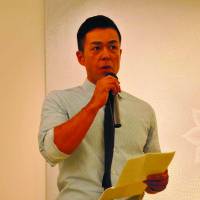An old school mentality was brought into a brand-new exercise room recently, when BodyPlus International, a sports supplement company, opened a new training facility called Haleo Omotesando in Shibuya on Tuesday.
Haleo Omotesando mainly provides training programs for Brazilian jiujitsu and kickboxing and also has physical training spaces in the facility, which company CEO David Halton calls a "dojo" instead of a sports gym.
"Sports gyms (are a place) for physical and mental training. When you push yourself past your limit, you also train your mental (as well as physical)," Halton said. "Dojo is training your heart.
"In the dojo you have bowing and meditation. You are giving thanks to the venue and people and your teachers," Halton added. "Little by little, like physical training, you think of the gratitude and respect. That makes your heart stronger. This is the difference from sports gyms."
Halton values so-called konjo (guts) and konjo-ren (guts-forced training), which are often denied as old-fashioned and nonsensical training methods.
"When I asked (former Brave Blossoms captain) Michael Leitch why Japan did so well (in the 2015 Rugby World Cup), he said the team had the combination of konjo training and the highest technology of physical training," Halton said. "Konjo still exists in Japan. It is very important."
In the Brazilian jiujitsu and kickboxing programs, most of the instructors have won a championship at some level, such as Roberto Satoshi Souza, a four-time Brazilian jiujitsu world champion.
"Champions have already developed," Halton said. "(Average instructors) can teach techniques, but champions can teach other aspects by being a good role model. They are stronger than other people. They don't give up. You can learn this only from somebody who's already achieved."



